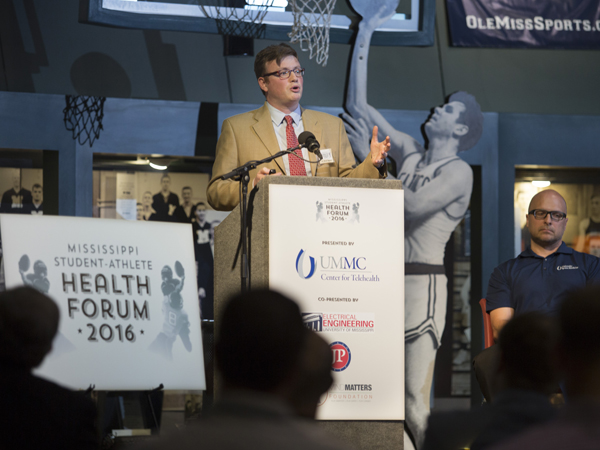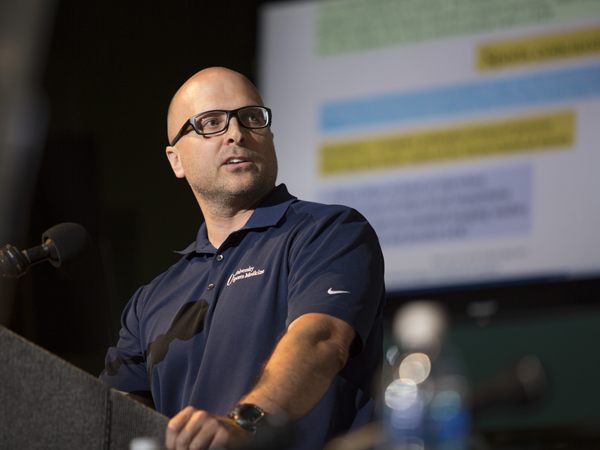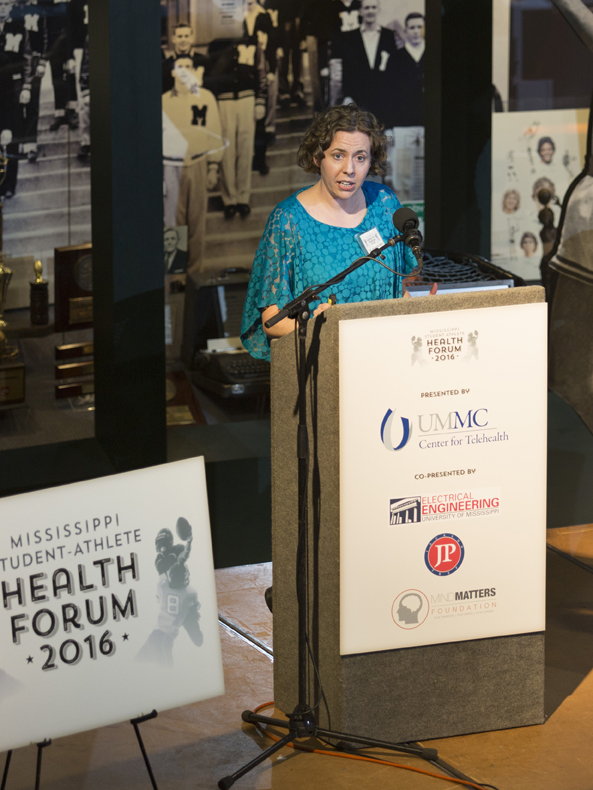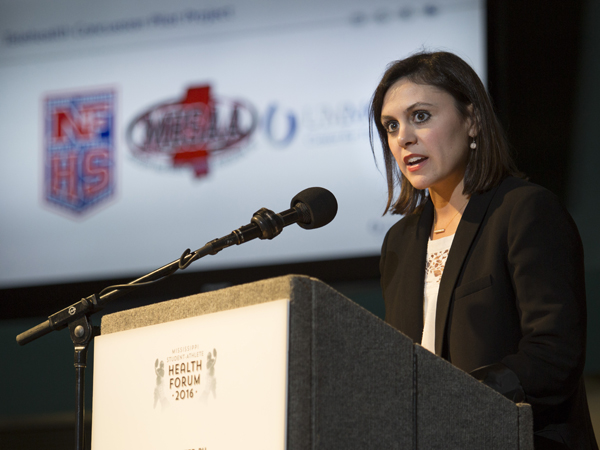Tackling sports injuries quickly key to recovery, UMMC experts tell coaches

The force of a tackle throws a 16-year-old wide receiver backward, his head, encased in a helmet, striking the ground.
The young player, wanting to stay in the game, tries to hide his dizziness. The actions and insight of his coaches, trainers and the sideline doctor on the scene could mean the difference between recovery and neurological injury or even death, said experts from UMMC speaking at the 2016 Mississippi Student-Athlete Health Forum.
The Thursday event at the Mississippi Sports Hall of Fame featured UMMC associate professor of emergency medicine Dr. Brian Tollefson, assistant professor of pediatric neurology Dr. Brad Ingram and assistant professor of neurology Dr. Amanda Witt in a panel discussion on sports concussions as well as a presentation on the UMMC Center for Telehealth Concussion Pilot Project given by telehealth project manager Elizabeth Joseph.
Tollefson tells coaches and trainers at the forum how to identify concussions on the sidelines.
Other potentially life-threatening topics on the forum agenda included heat, hydration and cardiac concerns, which were discussed by Mississippi Sports Medicine director of athletic training outreach services Mike Wilkinson, Ole Miss All-American and former NFL player Terrence Metcalf and Joseph Shaw, assistant athletic director and equipment manager for Jackson State University.
Keynote speaker, Brad Gaines, a former Vanderbilt football player, and Jason Walton, head of school at Jackson Prep, spoke about the tragedies that can happen on the playing field, and Mississippi High School Activities Association executive director Don Hinton and Mississippi Association of Independent Schools director of activities Les Triplett encouraged coaches and trainers to watch for early signs of distress along the sidelines and at practices.
Witt tells coaches of the importance of letting concussion patients return to activity gradually.
Concussions, a type of traumatic brain injury that is causes by a blow to the head or body, a fall or other injury that shakes the brain inside the skull, were on the agenda much of the afternoon, with Matthew Morrison, associate professor of electrical engineering at the University of Mississippi, giving a presentation on X2 Biosystems, a combination of monitoring head impacts and performing neurocognitive testing.
Some 4 million to 5 million concussions occur each year, said Tollefson, “and they are grossly underreported. Kids are reluctant to report symptoms of a concussion because they want to stay in the game.”
Symptoms of concussions can be easy to miss and can be as vague as a player “not feeling right,” after a bump or jolt to the head, he said. Other red flags signaling a possible concussion include headache, nausea, poor balance, confusion and drowsiness.
“The best move is to go off the field” if a concussion is suspected, said Tollefson, who is board certified in sports medicine.
Taking players with possible head injuries out of the game is vital, he said, because Second Impact Syndrome, a hit, even a minor one, after an earlier concussion, can result in immediate cerebral swelling, coma and death.
Joseph tells the audience of coaches and trainers about the expansion of the Telehealth Concussion Pilot Project.
The UMMC Center for Telehealth Concussion Pilot Project, started in the 2015 football season, is being expanded to include even more schools in 2016, said Joseph. The program links Tollefson via a secure video connection with high school football coaches and trainers, many in rural areas of the state. He can then observe a player suspected of having suffered a concussion and make recommendations for care.
“When you see a player with a concussion, the damage is done,” said Ingram. “There is no magic pill to make it go away. You have to allow it to heal, with the goal of avoiding further injury.” The healing process means no sports that could put the patient at risk for a second injury, plenty of sleep and neurocognitive rest, which can mean taking a break from academics as well as from video games.
Without proper rehabilitation after a concussion, said Witt, there could be months, years or a lifetime of impairment “for something that didn't seem like a big deal at the time. We want to make sure that their brains last these kids a lifetime.”





